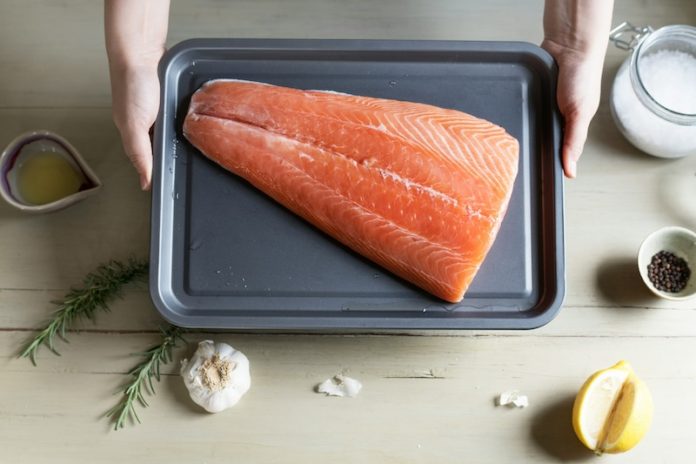
Omega-3 fatty acids are well-known for their health benefits, especially for the heart.
Found in foods like fish, flaxseeds, and walnuts, these healthy fats play a crucial role in lowering blood pressure.
High blood pressure, or hypertension, is a major risk factor for heart attacks and strokes. Researchers have been studying the link between omega-3 and blood pressure for years, and the evidence points to a clear benefit: omega-3 can help keep blood pressure in a healthy range.
In this review, we’ll explain how omega-3 works and what researchers have discovered about its impact on blood pressure.
Omega-3 fatty acids are essential fats, which means our bodies can’t produce them on their own. We have to get them from food or supplements.
The most important omega-3s are called EPA and DHA, and they are mainly found in fatty fish like salmon, mackerel, and sardines. These omega-3s help the body in many ways, including reducing inflammation and improving blood flow.
Research has shown that omega-3 fatty acids can help lower blood pressure by relaxing blood vessels and reducing inflammation.
A study published in the American Journal of Hypertension found that people who ate more omega-3-rich foods had lower blood pressure compared to those who didn’t.
The researchers believe this is because omega-3s help blood vessels widen, allowing blood to flow more easily, which in turn reduces blood pressure.
One key study that supports this was conducted by scientists at the Harvard School of Public Health. They looked at data from over 70,000 people and found that those who had higher levels of omega-3s in their blood had lower blood pressure.
In fact, people with the highest omega-3 levels had an average reduction in blood pressure of around 4-5 mmHg compared to those with the lowest levels. This may not sound like much, but even a small decrease in blood pressure can significantly lower the risk of heart disease.
Another major study called the Omega-3 Meta-Analysis combined the results of 70 different studies to get a clearer picture of omega-3’s effects on blood pressure.
The researchers found that taking omega-3 supplements reduced blood pressure in both people with normal blood pressure and those with hypertension.
However, the reduction was greater in people with hypertension, with some experiencing a drop of up to 5 mmHg in systolic blood pressure (the top number in a blood pressure reading) and 3 mmHg in diastolic blood pressure (the bottom number).
This shows that omega-3s can be particularly helpful for people with high blood pressure.
Omega-3s work in a few different ways to lower blood pressure. First, they help the body produce more nitric oxide, a molecule that relaxes blood vessels. When blood vessels are relaxed, blood can flow more smoothly, which lowers blood pressure.
Omega-3s also help reduce inflammation in the body. Inflammation can cause blood vessels to narrow, making it harder for blood to flow. By reducing inflammation, omega-3s help keep blood vessels wide and flexible.
In addition, omega-3s can reduce the body’s response to stress. Stress causes the release of hormones like adrenaline, which can make blood pressure spike.
A study published in The American Journal of Clinical Nutrition found that people who took omega-3 supplements had a lower blood pressure response to stressful situations.
This means that omega-3s not only help keep blood pressure low in normal situations, but they can also help prevent big spikes in blood pressure during stressful moments.
There’s also evidence that omega-3s can help improve heart health in other ways. They reduce triglycerides (a type of fat in the blood) and prevent blood clots, both of which are good for keeping blood pressure under control.
A study published in Circulation showed that people who ate more omega-3-rich foods had a 10% lower risk of high blood pressure compared to those who ate less. This suggests that eating more omega-3s could be a simple and natural way to prevent hypertension.
So, what’s the best way to get omega-3s? The most effective source is fatty fish like salmon, mackerel, and sardines, which are packed with EPA and DHA. If you’re not a fan of fish, you can also get omega-3s from plant-based sources like flaxseeds, chia seeds, and walnuts.
However, these plant-based sources mainly contain ALA, another type of omega-3 that isn’t as effective at lowering blood pressure as EPA and DHA.
Some people choose to take fish oil supplements to get a higher dose of omega-3s, which can be a good option for those who don’t eat fish regularly.
In conclusion, there’s strong evidence that omega-3 fatty acids can help lower blood pressure and improve heart health. They work by relaxing blood vessels, reducing inflammation, and lowering the body’s response to stress.
Eating more omega-3-rich foods like fatty fish or taking fish oil supplements can be a simple and natural way to keep blood pressure in a healthy range.
Even small reductions in blood pressure can make a big difference in reducing the risk of heart disease and improving overall well-being. Understanding the benefits of omega-3 can help people make healthier choices for their hearts and their lives.
If you care about blood pressure, please read studies about how diets could help lower high blood pressure, and 3 grams of omega-3s a day keep high blood pressure at bay.
For more information about blood pressure,, please see recent studies that beetroot juice could help reduce blood pressure, and results showing cinnamon could help lower high blood pressure.
Copyright © 2024 Knowridge Science Report. All rights reserved.



